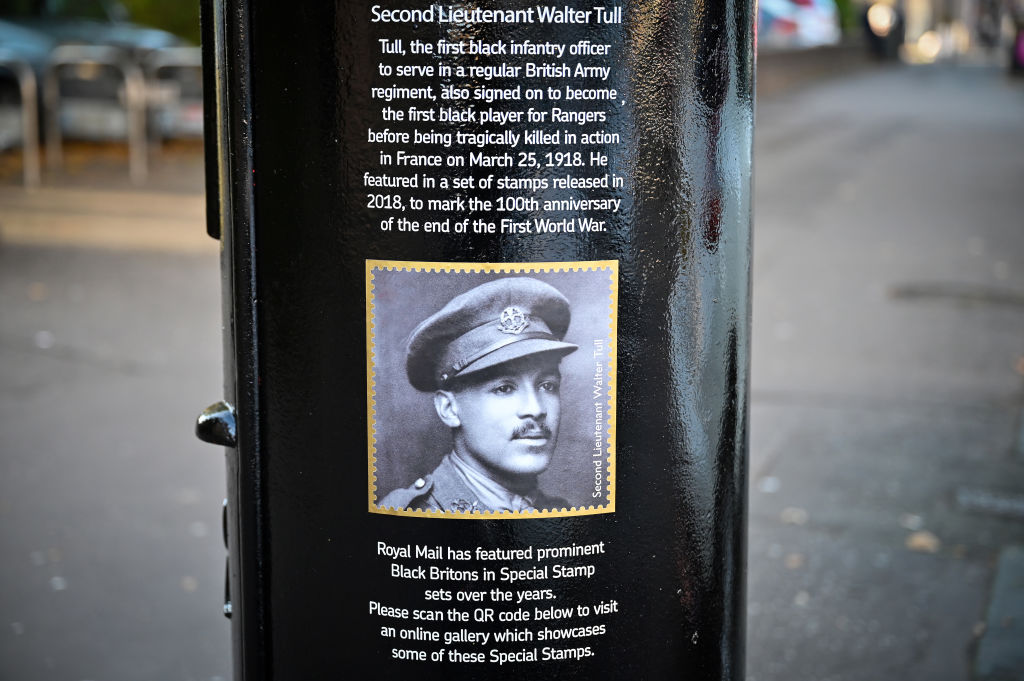
Source: Jeff J Mitchell / Getty
Black History Month is widely celebrated and honored in the United States, but you might be surprised to find that the UK celebrates the annual holiday too. October marks the start of the country’s month-long Black History celebration that commemorates the achievements of Black Britsh and Afro-Caribbean people throughout the UK.
Pan-African activist Akyaaba Addai-Sebo is widely regarded as the father of Black History in the UK, as he is often accredited with organizing the country’s first event in 1987. Addai-Sebo said that he was inspired to bring the western tradition across the pond after noticing an identity crisis stirring among young African and Caribbean children in schools about their origins.
“A colleague came to work one morning broken-hearted and in probing her why revealed to me in confidence that her seven-year-old son, who she had proudly and purposefully named Marcus, after Marcus Mosiah Garvey (a foremost Black nationalist leader), before going to bed, had asked her: “Mom, why can’t I be white?” the journalist shared during an interview with Black History Month UK. “In consoling this devastated mother, I was prompted to go around asking questions about ‘identity’ and to observe and talk to children more after school, in buses, parks, and in the playgrounds in the communities in some parts of London.”
Addai-Sebo worked alongside the Greater London Council and the Inner London Education Authority to create the annual celebration that he hoped would interconnect the stories and successes of African people and the continents decedents far and wide. But why is the holiday celebrated in October?
“We settled on the propitious month of October when the weather was not cold, and children were fresh after the long summer vacation and had less to worry about exams and tests, and the camaraderie was stronger as they shared experiences,” the author explained. “We believed that they would absorb more if their living environment buzzed with positive vibes, instructions and images about themselves and their origins, thus celebrating who they are as ‘Africans’ who gave the world the concept of monotheism (the worship of a one and only God); who helped to install the first electric lighting system in London, Amsterdam, and New York, in the person of Lewis Latimer, a pioneering partner of Thomas Edison and Nikola Tesler (credited with lightning the world) and many more. October in the UK as February in the US is to inculcate self-pride and especially in children. Self-pride is the catalyst for achievement, and there is no greater ‘truth’ than knowing yourself.”
In honor of the UK’s Black History Month, here are five Black History moments from British culture that you may not have been familiar with.
1. The Bristol Bus Boycott
18-year-old Guy Bailey organized a massive boycott of Bristol’s bus network in 1964 after the city’s Omnibus Company denied him a job because of the color of his skin. The young Brit teamed up with other members of the Black community, including Paul Stephenson and Roy Hackett, to lead the protest. After a four-month-long battle, the company ditched its racist policy. It was a milestone victory for Black British people, and it marked a significant step towards the UK building laws against race-based discrimination.
2. The Notting Hill Carnival
The annual festival is the second largest carnival in Europe, but the event wasn’t all fun and in games when it initially started in the late 1950s. Human rights activist Claudia Jones launched an indoor Caribbean carnival in St Pancras in 1959 to bring people together following the death of Kelso Cochrane, a young Black Carpenter from Antiqua who was killed by a group of white youths while walking home from the hospital.
Cochrane’s death caused an uprise of racial tensions across England. The carnival helped to build solidarity throughout the tense period. Following the event launch, many carnival festivals were held throughout the 1960s until it finally grew in size and took the streets of Notting Hill in 1965. Now, millions of people flock to English to celebrate the annual festival each year.
Jones, a Trinidadian native, sought asylum in England after being banned from the US for being a member of the Communist party in 1915.
3. The British Black Panthers
Heavily inspired by the American Black Power movement, the British Black Panther group was founded by Obi Egbuna in Notting Hill, London, in 1968. The London branch of the organization focused on fighting racial discrimination in jobs, housing, education, and health care.
4. The Mangrove Nine
The Mangrove Nine were a group of British Black activists charged with inciting a riot at a 1970 protest against the police targeting of The Mangrove, a Caribbean restaurant in Notting Hill, west London. Among the nine people arrested were British Black Panther members Altheia Jones-LeCointe and Darcus Howe. Forced to represent themselves during the trial, the group demanded an all-Black jury. The group was later acquitted, and the trial became the first judicial acknowledgment of behavior motivated by racial hatred within London’s police system.
5. West Indian Soldiers In The First World War
Caribbean men from several West Indian colonies fought during the UK’s first Great War in 1915. Many of the soldiers fought at their own will as they weren’t allowed to fight alongside white soldiers and faced racism from their comrades and enemy soldiers alike. The Black British soldiers were often tasked with dangerous jobs such as loading ammunition, laying telephone wires, and digging trenches. There is evidence some also saw combat, The Guardian notes.
See Also:
5 Events That Shaped Black History Month In The UK was originally published on newsone.com







